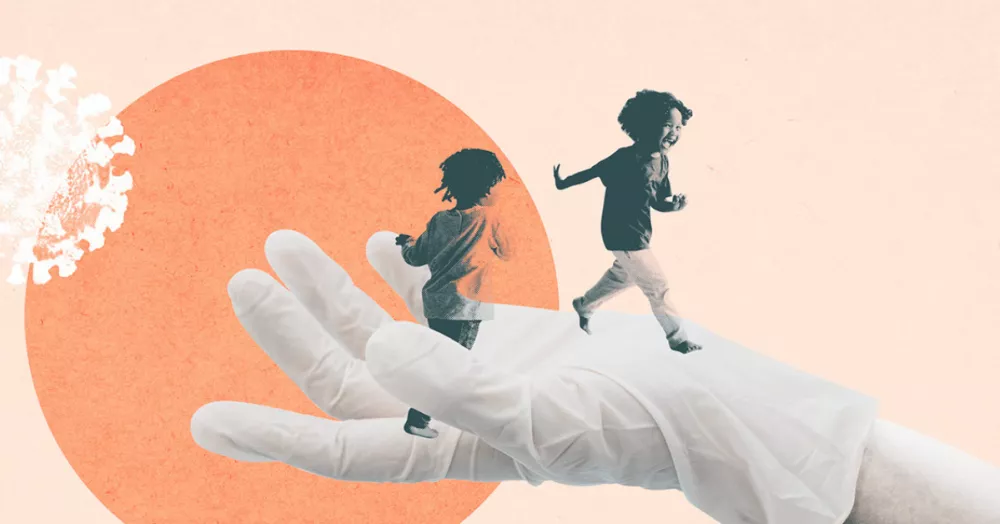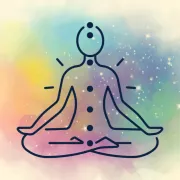Happy Hormones – The Biochemistry of Happiness
Happiness comes from within – quite literally, as a result of our hormones. In this article let's explore the biochemistry of happiness.

What is happiness exactly? Is it that sensation of security when someone dear to you gives you a warm tight hug, forcing you to smile, or is it that sense of thrill you feel in every nerve of your body as you descend a rollercoaster? Is happiness that feeling of fulfillment that mountaineers feel at the summit of the range they’ve mounted for hours or is it represented by the happy tears of a mother as she lays her eyes on her newly born? Ask children what happiness is and they’ll probably relate it to the sudden outburst of excitement when they are offered a popsicle. Ask athletes what makes them happy, and they’ll probably describe it as a rush of endorphins as they finish a marathon.
Happiness is an emotion. It is a feeling that varies in degrees of performance with every individual. It is a feeling that produces a chain of positive biological responses. It is not just a state of mind but also a state of the body.
A philosophical and psychological approach
A more philosophical approach toward happiness is a sense of fulfillment in various aspects of life. The theory defines the achievement of happiness in three aspects of life namely – the Pleasant Life, the Good Life, and the Meaningful Life. The Hedonistic Theory defines happiness as the mere presence of pleasure. In simple terms, minimizing pain and maximizing pleasure.
The renowned psychologist Sigmund Freud had an entirely different approach to happiness. He defined happiness as the absence of pain one feels without suppressing their drives and erotic instincts. Several other psychologists have also devised various scales representing different aspects of one’s life to measure happiness. The Yogic philosophy on the other hand states that happiness is the pure nature of our soul. It is a state of ultimate bliss one feels from attaining a state of self-realization.
Feeling stagnated and stuck? Need to relieve stress? Try these yoga poses to get you through the slump.
lifeism.coHappiness can be biological
Happiness can be a complex concept. We as humans are evolving and things around us are changing rapidly. People have different approaches to life and with it comes different paths to understanding the same concept. Today we look for a scientific explanation for many complex life concepts. Happiness, too, can be viewed from a biochemical lens.
Years of research has proven that the psychological aspect of human beings is connected to the somatic aspects. The two are interrelated and share a cause-effect relationship. Happiness too finds itself in these forms. Happiness is a two-dimensional theory and can be caused by endogenous factors such as biological/cognitive/personality or even exogenous factors such as environment/socio-economical/behavioral factors. For decades together there have been detailed talks about how our surroundings or external factors can play a major role in affecting our happiness, but it is fairly recent that a talk has been stirred around its biological and psychological factors.
This TEDx video describes the concept in brief along with a few simple tips to use biochemistry to hack happiness.
How neurotransmitters influence our state of happiness
Biologists state that happiness isn’t driven by external stimuli. It is a range of internal changes and factors within our physical bodies that attribute to happiness. According to them, happiness is nothing but a reaction to the secretion of various biochemical substances and neurotransmitters. The brain is the center of control of all the physical and mental functions of the body, be it movement, breathing, pumping of blood, or regulation of stress and anxiety. All these activities are induced by the brain. The brain influences our state of happiness too.
Neurotransmitters control happiness to a great extent. Neurotransmitters are chemical substances secreted by the brain which act as chemical messengers by transmitting signals from the brain neurons to various parts of the body. The increase in the levels of several neurotransmitters may increase happiness by bringing out a positive impact on our overall mood. Dopamine and serotonin are two important neurotransmitters that regulate our mood.
Recommended Reading: Life's Simple Pleasures that bring Joy.
Types of neurotransmitters
Here is the list of neurotransmitters that are important for happiness – and how they influence our feelings and moods:
- Dopamine – This hormone is also known as the ‘feel good hormone’ and is responsible for cognitive functioning, motor skills, and pleasure. Research states that a positive mood can be associated, if not fully attributed, with an increased level of dopamine in the body which thus leads to happiness.
- Norepinephrine- This is responsible for the control of facial expressions and mood in general. Several antidepressants work by stimulating the production of this neurotransmitter.
- Serotonin- This is one of the most important neurotransmitters secreted by our body. It regulates emotional responses, mood, and memory. The serotonin levels in one’s body are considerably reduced during the state of depression and certain anti-depressant drugs work the opposite way by increasing the secretion of serotonin.
- Endorphins- These neurotransmitters are released during the performance of several activities such as exercise, sports, sex, or even eating. They boost happiness by relieving pain and are thus known as the pain relievers of our bodies.
Our neurotransmitters are also responsible for getting us in a state of flow – the feeling of ultimate productivity. We cover it in detail in the article below.
The state of flow is studied by many psychologists and is touted as a powerful indicator of overall wellbeing. So, what is the state of flow? Let’s dive deeper.
lifeism.coNeurotransmitters in our day-to-day activities
Let us look at some daily life examples to understand this concept further. We look at infants or children in their early years of life and they jump about, play, and laugh more than average adults. Our childhood memories of playing with our friends and playing the sport we enjoyed are again filled with moments of happiness. A lot of this is attributed to the secretion of neurotransmitters. Any physical activity in the right amount produces a level of neurotransmitters in our bodies, in specific endorphin, which stimulates happiness by relieving pain. This attributes to an overall improved mood. After the right amounts of workouts or even yogic activities, we automatically feel refreshed and charged.
The benefits of sun-bathing
Soaking up the warmth of the sun and basking by the side of a swimming pool or the shore of a sea at the beach can leave most people feeling tranquil and calm. Research states that sunlight increases the production of serotonin and endorphin. Research carried out across various parts of the globe has shown a difference in the overall mood and energy levels among people living in different climatic zones. In colder regions, due to a lack of sunlight and lower temperatures, people tend to be less active compared to those living in tropical climates. Colder regions also have higher cases of depression induced by the change in seasons. Seasonal depression during winters is a common psychological issue faced by many people living in these climatic conditions.
Happiness and sleep
There also exists a strong link between happiness and sleep. A long night of uninterrupted sleep leaves us feeling happier and fresher in the mornings compared to fewer or more disturbing hours of rest. Lucid dreaming throughout the night too can leave us feeling more irritable and annoyed. A major reason for this is that lack of proper sleep means that our body cannot recover properly which also influences our mood. Sleep deprivation can not only impair cognitive functioning but also increase the levels of stress hormones in our bodies.
Studies show that happiness is also related to the level of the melatonin hormone. Several other hormones such as oxytocin, melatonin, cortisol, and adrenaline too may influence happiness by regulating basic body functions such as metabolism, immune functioning, or psychological functioning.
How can you hack your happy hormones?
Given the scientific explanation, happiness can be hacked in several ways. Here are a few ways to hack your happy hormones:
- Start your day by basking in some sunlight. Sunrays boost the production of endorphin which attributes to your state of happiness. Sungazing is another ancient Indian technique that does the job well!
- Find some time in your day to accommodate a quick 30-minute workout if not more. Be it a walk, a quick run, dancing to the beats of some lovely Hispanic music during your Zumba class, or even lifting weights. This increases the secretion of endorphin too.
- Meditation and other breathing exercises increase the production of dopamine.
- Manage your stress levels. Indulge in activities that calm you down and take timely breaks from your hectic work or studying schedule.
- Fix your sleep cycle. Early to bed and early to rise is the best way out for the effective performance of hormones and their role in happiness. Make sure you get at least 8 hours of sleep daily.
- Activities that induce love also induce happiness by regulating hormone secretions. Plan a nice romantic date, go on those lovely long drives, and share those intimate moments with your partners or loved ones. The phrase “Getting butterflies in one’s stomach” was formulated for a reason!
- Regulate your diet and eating habits. Eat healthily and maintain a balance while still allowing yourself the occasional indulgences. Food rich in potassium, spicy foods, or those containing probiotics and vitamins can also stimulate the production of happy hormones.
- Have that piece of dark chocolate or your favorite chocolate slab!
- Spend more time outdoors and in natural settings. The feeling of being close to nature and inhaling all that fresh air can regulate the serotonin and endorphin levels.
- Go on more adventures, be it a rollercoaster ride, trekking, swimming, or paragliding for the endorphin rush leaves us feeling happy.
- Spend more time with your pets, family, and loved ones.
- Indulge in activities that leave you feeling refreshed and make more time during the day for your hobbies.
- Spend time in nature. If you are a city dweller, take a walk in a garden near your apartment or get some plants at home.
Happiness is a choice
While happiness can be a subjective topic, a large part of it is also biological and has a lot of scientific backing up to it. When people state that “Happiness is a state of the mind” or “Happiness is in your hands”, they aren’t wrong. Happiness is indeed a choice. Several external events or circumstances may trigger your overall emotional state but all it takes is knowing yourself enough to hack into your happy hormones via indulging in activities that work best for you. The power of your happiness lies within you!










Comments
it lovely to finally understand reason behind sudden burst of happiness that i experience
[Comment marked as inappropriate]